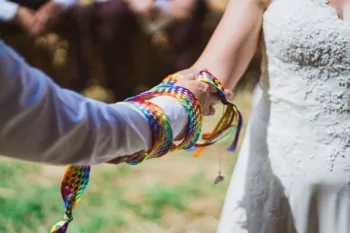You’re engaged! Huge congratulations! Now it’s time to start your wedding planning. If you’re not a religious person, you may be thinking about ways to celebrate your love without including religious content, while still creating a meaningful wedding ceremony. A humanist wedding will allow you to work with a highly trained celebrant to craft a ceremony that reflects your personalities and tells your love story.
Here’s our simple guide to planning a meaningful non-religious wedding ceremony.
What is a Non-Religious Wedding Ceremony?
A non-religious wedding is a ceremony that doesn’t include religious traditions, prayers, or references to faith. Instead, the focus is on the couple themselves, the loving relationship, and the commitment they are making to one another.
Weddings led by a secular celebrant tend to be more flexible than traditional religious weddings, meaning that you can decide what elements matter most to you as a couple, choosing to include rituals that you like and leaving out any traditions that don’t suit you.
A humanist wedding ceremony
A humanist ceremony is a great choice for those wanting to plan a wedding that’s thoughtful and personal. The beauty of a humanist wedding is that it allows you to create a completely personal event, creating a ceremony that is unique to you.
Humanism is a belief in human values like empathy, kindness, and the importance of making the most of the one life we have. Humanists make sense of the world through logic, reason, and evidence, and seek to treat those around us with understanding and respect.
Benefits of a humanist celebrant:
- Personalisation: Your ceremony will be written specifically for you. Your celebrants will work with you to create a unique script and, if you need ideas, be able to offer suggestions for music, readings, and rituals, to make your ceremony totally authentic and personal to you both.
- Flexibility: There are no set rituals or traditions you need to follow, giving you full creative control to include what you like and leave out what doesn’t suit you.
- Inclusivity: Humanist weddings are welcoming to people of all beliefs, ensuring all guests – including religious guests – feel part of the celebration.
- Meaning: The focus is on your love and commitment to one another, without including religious content, making the ceremony authentic to you as a couple. By focusing on your commitment you’ll have a ceremony that’s heartfelt and memorable.

Why choose a Humanist Ceremonies wedding celebrant?
You can trust a Humanist Ceremonies celebrant. They are highly trained by Humanists UK to create and conduct weddings which focus on the couple’s story, their shared values, and the love they have for each other. A Humanist Ceremonies celebrant will spend time getting to know you as a couple, ensuring the ceremony is unique to you.
We’ve been conducting wedding ceremonies for over 120 years, and all of our celebrants are insured, annually accredited by Humanists UK, and are DBS checked so you can be reassured of a professional service. They are part of a national network of Humanist Ceremonies celebrants who share values, knowledge and best practice, and support each other.
Find a humanist celebrant near you by using our easy-to-use map
How to personalise your non-religious wedding ceremony
One of the main attractions of a humanist wedding is the chance to make your ceremony completely personal. A Humanist Ceremonies celebrant will be able to work with you to create a unique ceremony full of personal touches. To get you started here are just a few ways to ensure your wedding reflects who you are as a couple:
Write your own vows
Personal vows are a beautiful way to express your love and commitment. Without the constraints of traditional vows, you can write words for each other that are deeply meaningful to you both. Share stories, promises, and hopes for your future together. A Humanist Ceremonies wedding celebrant will be able to give advice on vow writing and provide you with some examples as inspiration to get you started.
Include readings
A humanist wedding gives you the freedom to choose readings that resonate with you. These could be excerpts from books you love, poems, song lyrics, or even something you’ve written yourselves. The readings can be about love, life, or anything that reflects your relationship.
Symbolic wedding rituals
Even though your ceremony is not religious, you can still incorporate symbolic elements. Some couples choose to include rituals like handfasting, where the hands are bound together, to represent the commitment to each other.
Here is our guide to handfasting.

You can also light a unity candle, have a sand blending, or plant a tree together as part of the ceremony. You could also create your own unique ritual that holds special meaning for you both.
Involve friends and family in your wedding ceremony
If you’d like to involve your loved ones in your ceremony, there are many ways to do so. They could give a reading, share a few words, play some music, or even sing. Some symbolic rituals involve family members and friends, or even all the guests. Having the participation of those present can help to create a sense of community during this special day.
Choosing the perfect wedding venue for a non-religious wedding ceremony

A humanist wedding can take place anywhere, giving you the freedom to choose any location that feels significant to you. That could be an outdoor location with sentimental value, such as where you had your first date, or the pub or restaurant where you decided to get married.
Some popular venue choices for humanist weddings include:
- Gardens and parks Ideal for nature lovers, offering a peaceful and joyful setting.
- Historic buildings If you love architecture and history, a stately home, country house, or historic venue can provide a wonderful backdrop.
- Beaches and coastal spots For a relaxed and informal wedding, the beach is a great choice and one that’s growing in popularity.
- A village hall or hotel function room
- Your own home or garden An intimate, personal space adds warmth and familiarity to your celebration, especially good for a low-key or micro wedding.
The key is to pick a venue that suits you, one that makes you feel comfortable, and allows you to create the atmosphere you want. Also it’s good to consider if the venue will be inclusive and accessible for all of your guests.
Legal requirements for a humanist wedding ceremony
If you’re having a humanist wedding ceremony in England and Wales, it’s important to know that you’ll also need to have a civil registration of your marriage to make it legally binding. Many couples choose to have a small legal ceremony at the registry office either before or after their humanist wedding, with just the two of them and two witnesses. This way, your humanist ceremony can be the main event, focusing on your love and values.
You only need to have one humanist ceremony if you’re getting married in Northern Ireland, Scotland, or Jersey where humanist marriage is legally recognised.
Planning a non-religious wedding with a humanist celebrant can create a wedding ceremony that feels authentic to you. With the freedom to choose your location and venue, share ideas with your celebrant, personalise your vows, and add meaningful rituals, a humanist wedding will be a day that truly reflects your values and your love for one another.
Read more
Looking for more wedding inspiration? Check out these other fabulous real-life humanist weddings:
- We had a humanist wedding after 22 years together
- 24 years together, five children, and the perfect humanist ceremony: Sarah and Ravi’s fun multi-cultural wedding
- Lewis & Imanina’s countryside elopement
- Lauren & Chris’ castle wedding in Northern Ireland
More about humanist weddings





